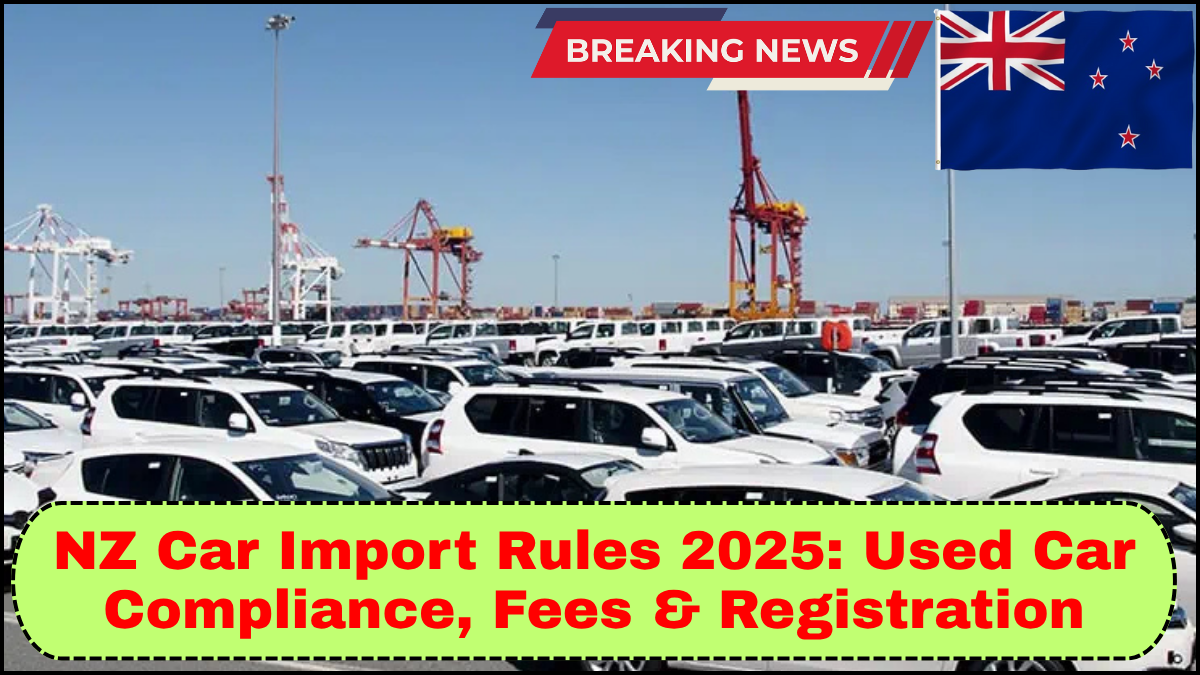The NZ Car Import Rules 2025 have been updated to ensure higher environmental standards, vehicle safety, and better consumer transparency. If you’re planning to import a used car into New Zealand, whether for personal use or resale, it’s crucial to understand the latest compliance requirements, costs, and registration process. These changes affect both individuals and businesses looking to bring vehicles from overseas, especially from popular markets like Japan, the UK, and Australia.

Importing Used Cars: What You Need to Know
Importing used cars into New Zealand isn’t as simple as shipping and driving. There are several layers of regulations to navigate. As of 2025, the government has tightened compliance rules to align with emissions goals and safety standards. Every vehicle must meet specific criteria before it can be registered for road use.
Age and Emissions Standards
One of the most significant changes in the 2025 rules involves age limits and emission regulations. Petrol vehicles must meet Euro 5 standards, while diesel vehicles must meet Euro 6. Used cars older than 8 years are now subject to stricter inspections and may be denied entry if they don’t meet minimum emissions requirements. Hybrid and electric vehicles are encouraged through lower levies and faster compliance processing.
Structural and Safety Compliance
All imported vehicles must pass a border inspection to verify structural integrity. This includes checks for rust, crash damage, and unreported repairs. Airbags, ABS, ESC (Electronic Stability Control), and child safety anchor points are mandatory for most passenger vehicles. The government has increased scrutiny of safety features in 2025 to align with global standards.
Compliance Process for Imported Vehicles
Before you can register a used vehicle in New Zealand, it must go through the compliance inspection process. This involves several steps:
- Entry Certification: Conducted by NZTA-approved agents, this inspection checks that the car meets NZ standards.
- Border Inspection: Ensures the vehicle hasn’t been previously written off or damaged.
- Emission Testing: Validates that the car complies with 2025 emissions benchmarks.
- Structural Certification: For modified or repaired vehicles, this confirms roadworthiness.
Failure at any stage means the vehicle cannot be registered until necessary repairs or modifications are completed.
Fees and Associated Costs
Importing and registering a used vehicle in New Zealand involves several fees:
- Import Duty: Generally not applied to personal imports from countries with trade agreements (e.g., Japan, Australia).
- Goods and Services Tax (GST): 15% of the car’s value, including shipping and insurance.
- Entry Certification Fee: Around NZD 350 to NZD 500.
- Compliance Costs: Vary depending on required modifications.
- Registration Fee: Includes license plates and Warrant of Fitness (WoF), typically around NZD 300 to NZD 600.
Optional costs may include valet inspections, insurance premiums, and transport within New Zealand.
Vehicle Registration in New Zealand
Once a vehicle has passed compliance inspections, it can be registered. The registration process includes:
- Vehicle Licensing: Pay for road user charges (RUC) if the vehicle is diesel or a heavy EV.
- WoF (Warrant of Fitness): Must be issued by a licensed inspector.
- Number Plates: Issued upon first registration.
- Registration Certificate: Issued under your name, making the vehicle legally allowed on New Zealand roads.
Additional Considerations for Importers
- Right-Hand Drive (RHD): NZ mandates that imported vehicles must be RHD unless exempt.
- Odometer Verification: Fraudulent readings are a major concern. Vehicles undergo checks to ensure mileage authenticity.
- Biosecurity Inspection: NZ is strict about contaminants. The vehicle must be clean inside and out, free from soil, seeds, and insects.
Frequently Asked Questions (FAQ)
Q1: Can I import a left-hand drive vehicle into NZ?
Only under specific conditions, such as classic cars older than 20 years or special purpose vehicles.
Q2: How long does the compliance process take?
It typically takes 1 to 2 weeks, depending on the complexity and required modifications.
Q3: Do electric vehicles have to go through emissions testing?
No, EVs are exempt from emissions testing but must still pass safety and structural inspections.
Q4: What documents are needed for import?
You’ll need the original purchase invoice, proof of ownership, shipping documentation, and prior registration papers.
Q5: Are there penalties for non-compliance?
Yes. Attempting to register a non-compliant vehicle may lead to fines, seizure, or being forced to re-export the vehicle.
click here to learn more